Protein powders are a staple supplement for health-minded individuals looking to build muscle, elevate workouts, or support weight loss. With so many brands and options, it’s easy to get lost in an endless scroll searching for a good protein powder that can help you achieve your goals.
Choosing a reputable brand is a good place to start. Nutricost is a well-known supplement maker offering budget-friendly protein powders with a range of options like organic or grass-fed whey protein, organic pea protein, soy protein, and bone broth protein. But is it the right brand for you? Our team of testers and reviewers break it all down in our Nutricost protein powder review, evaluating effectiveness, safety, value, taste, and more, so you can make an informed choice.
Medical disclaimer: This article is intended for educational and informational purposes only. It is not intended as a substitute for medical advice. For health advice, contact a licensed healthcare provider.
Nutricost protein powders
Compare Nutricost protein powders
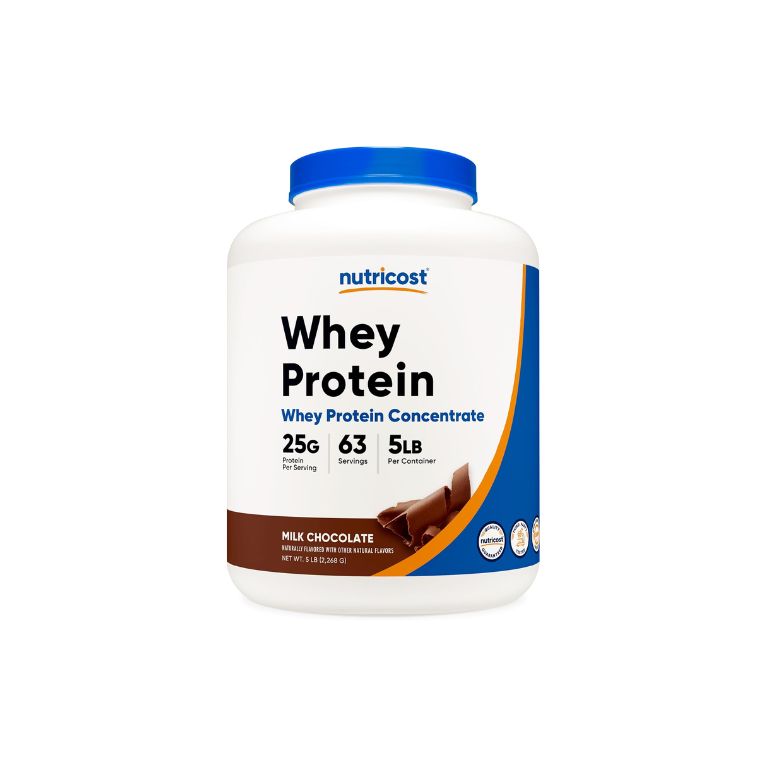
|
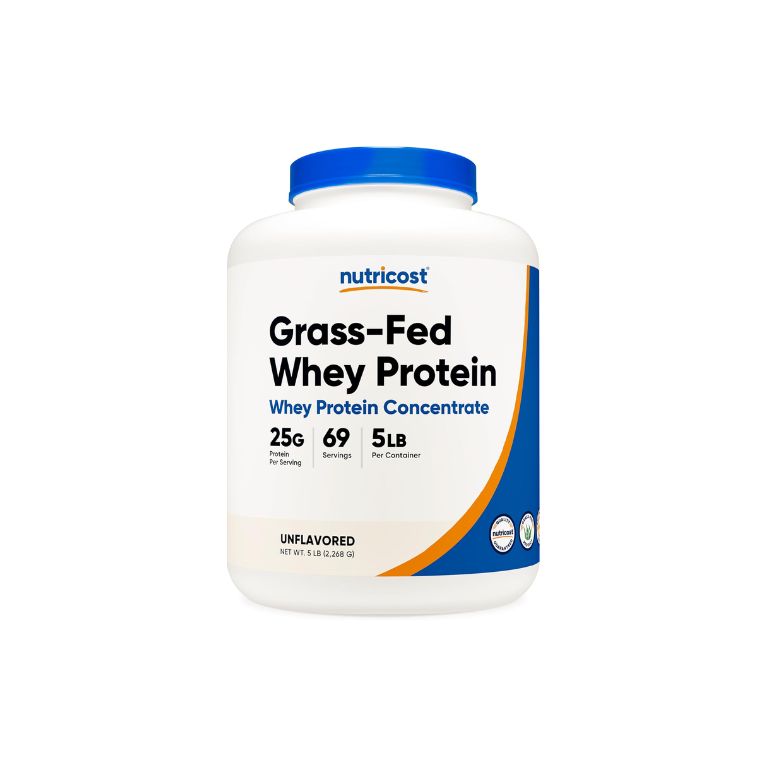
|
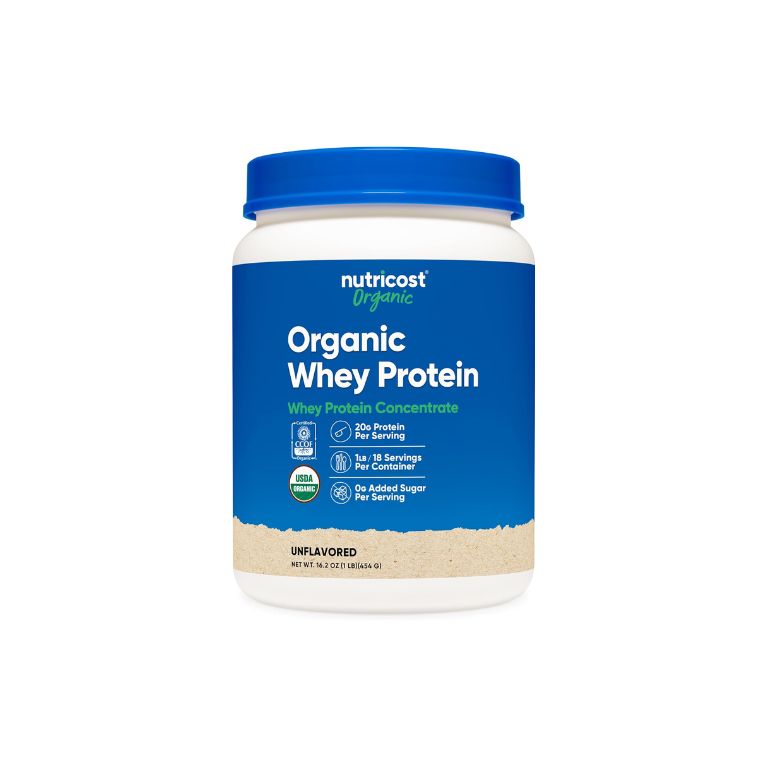
|
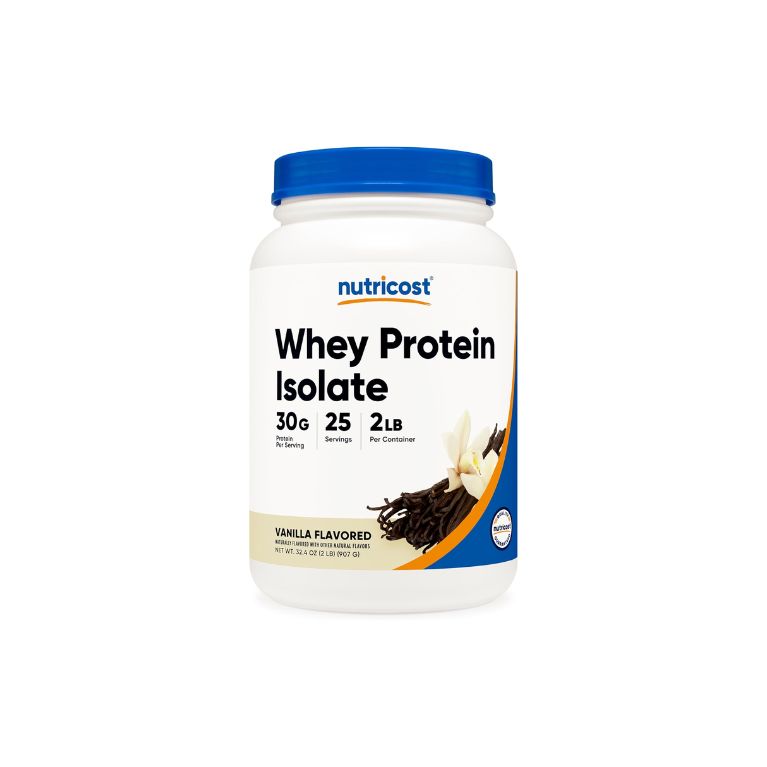
|
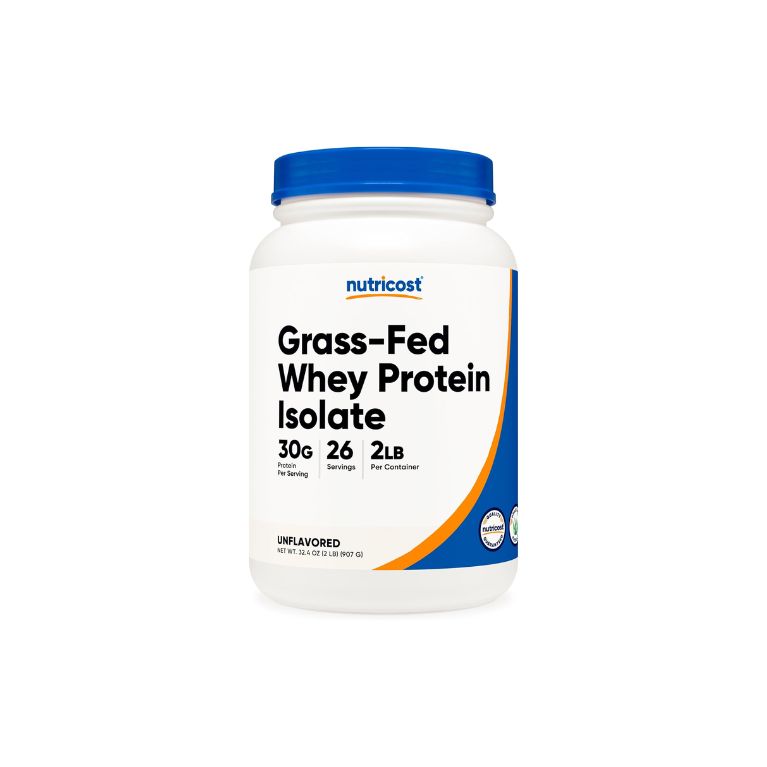
|
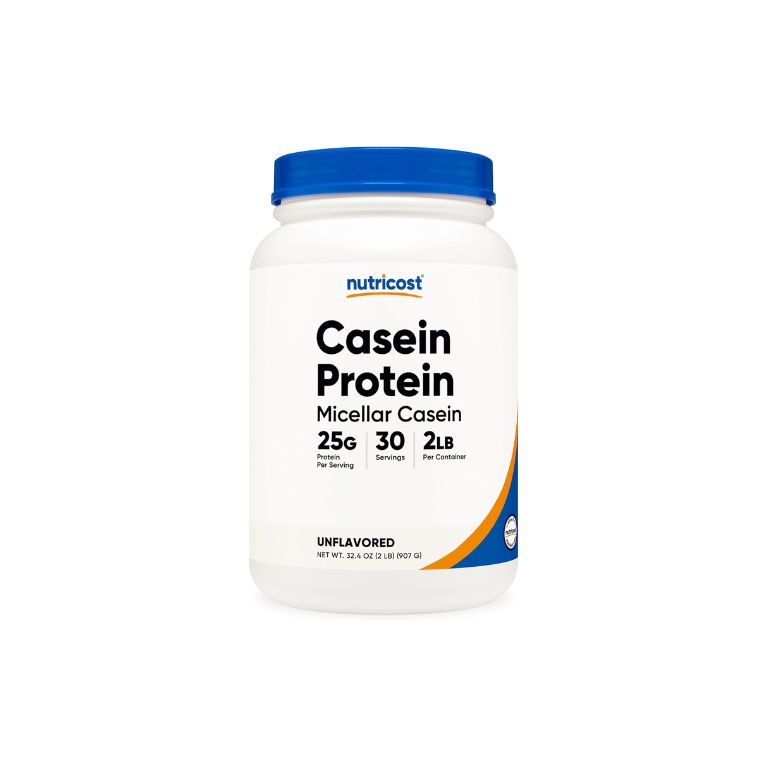
|
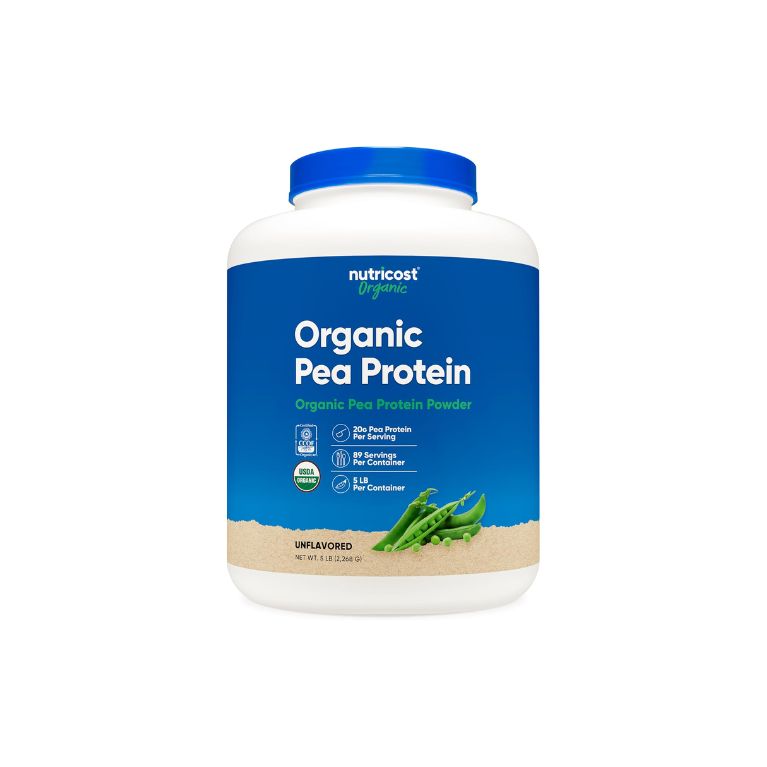
|
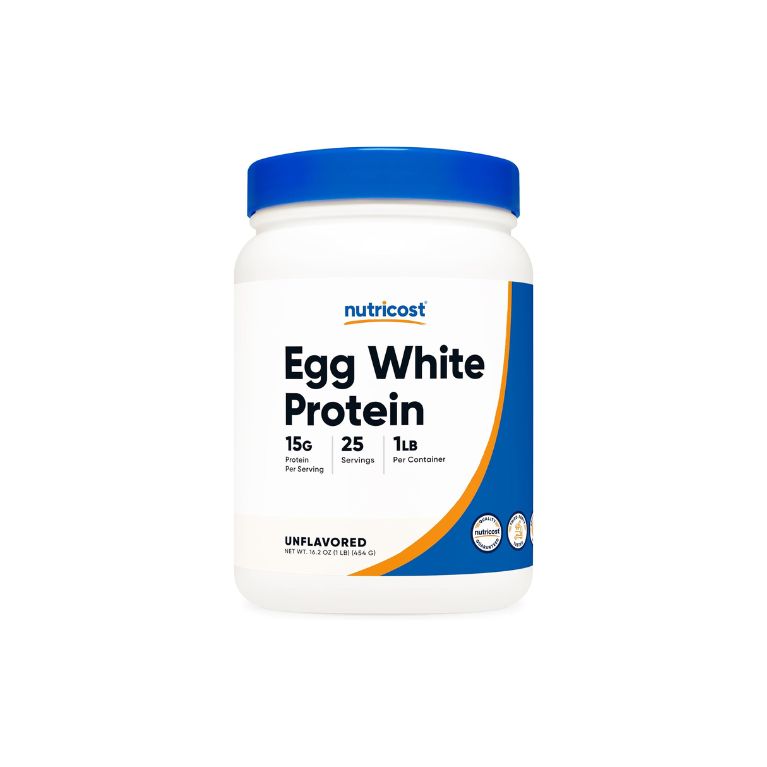
|
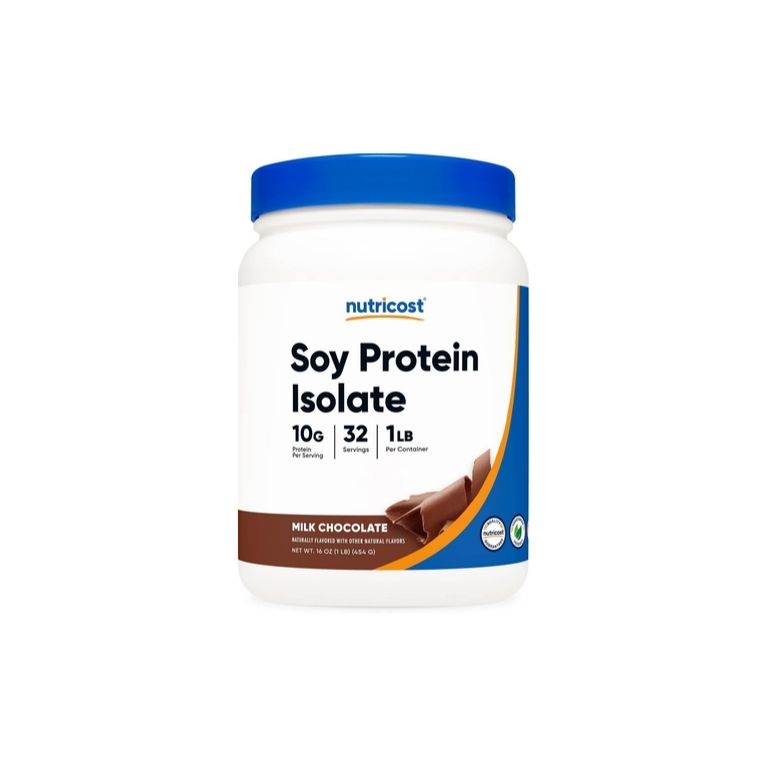
|
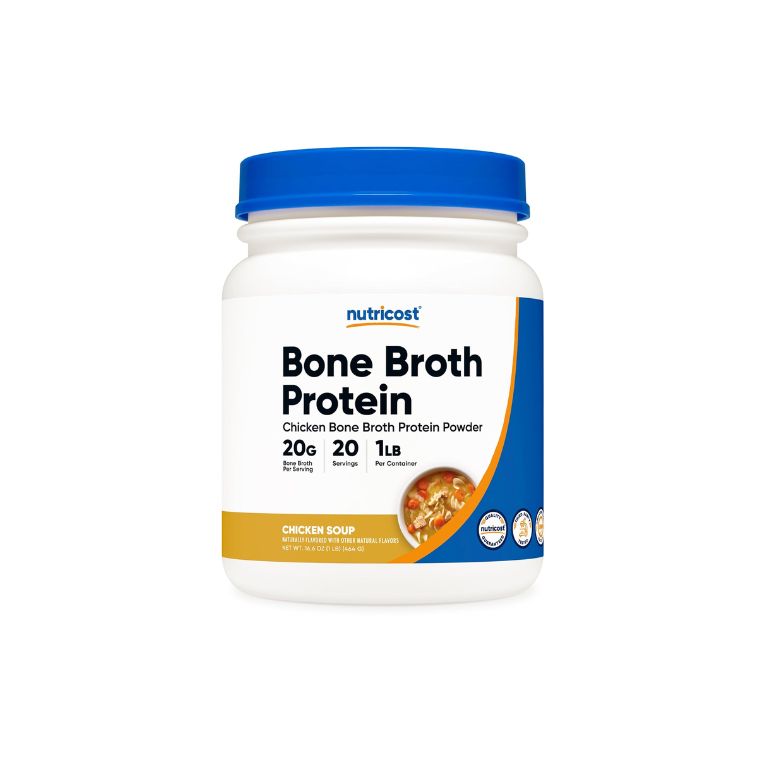
|
|
| Whey Protein Concentrate | Grass-Fed Whey Protein Concentrate | Organic Whey Protein Concentrate | Whey Protein Isolate | Grass-Fed Whey Protein Isolate | Casein Protein | Organic Pea Protein | Egg White Protein | Soy Protein Isolate | Bone Broth Protein | |
| Rating | ||||||||||
| Price per serving | $1.63 | $1.62 | $1.47 | $2.15 | $1.69 | $1.60 | $1.48 | $1.20 | $0.67-$0.84 | $1.30 |
| Protein per serving | 25 g | 25 g | 20 g | 30 g | 30 g | 25 g | 20 g | 15 g | 10 g | 20 g |
| Protein source | Whey protein concentrate | Grass-fed whey protein concentrate | Organic whey protein concentrate | Whey protein isolate | Grass-fed whey protein isolate | Instantized micellar casein | Organic pea protein isolate | Egg white protein | Soy protein isolate | Chicken bone broth protein powder |
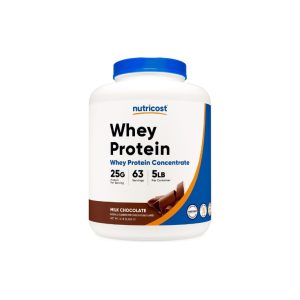

Key product features
What you should know
Nutricost Whey Protein Concentrate is a quality supplement providing 25 grams of protein per serving. The protein powder is budget-friendly, available in five flavors, and third-party tested for quality and safety.
- Whey protein concentrate is a type of whey that undergoes additional processing to remove most of the carbs and fat, increasing protein concentration. (1)
- Nutricost is known for offering budget-friendly supplements, and at $1.63 per serving their Whey Protein Concentrate is about $0.30 less than the average market price for protein powders.
- Fitness-focused individuals looking for a quality protein powder that won’t break the bank may want to try Nutricost’s Whey Protein Concentrate.
- The flavored protein powders contain artificial sweeteners, including sucralose and acesulfame potassium (AceK).
Our take on Nutricost Whey Protein Concentrate
Nutricost Whey Protein Concentrate is an affordable, high-quality protein powder that comes in four delicious flavors as well as unflavored. Whey protein is a popular protein powder supplement many people use to achieve different health goals.
Whey is a fast-digesting milk protein with an ideal amino acid profile that supports muscle protein synthesis (MPS). (2) Whey is rich in branched-chain amino acids (BCAAs) and is especially high in leucine, which is a key amino acid that drives protein synthesis. (2) This blend yields around 2.5g leucine per serving.
Whey protein concentrate, which is in this Nutricost supplement, is processed to remove most of the fat and carbs. Nutrition information varies slightly by flavor, but they’re all low in fat and carbs and high in protein. One scoop (1/3 cup) of the protein powder has 130 to 150 calories, 1 to 4 grams of carbs, 2-3.5 grams of fat, and 25 grams of protein.
Nutricost Whey Protein Concentrate also supplies the right amount of protein per serving. The International Society of Sports Nutrition (ISSN) says getting 20 to 40 grams of high-quality protein about every three to four hours is optimal for building muscle. (2) And preferably 0.2g/kg or more within an hour post workout.
We do like that all of the protein powder flavors are a good source of calcium, meeting 15% of the daily value. However, we want to point out that the flavored protein powders are higher in sodium, meeting more than 10% of the daily value, from added salt. You do need some sodium to support basic body functions, and for those who are very active, sweating a lot, may need more electrolytes, but getting too much—more than 2,300 milligrams a day—may increase the risk of high blood pressure. (3)
Nutricost Whey Protein Powder is third-party tested, meaning it’s evaluated by an independent lab to make sure the ingredients match the label. (4) Third-party testing is one of the factors we use to evaluate supplement safety and quality, ensuring supplements don’t have unknown ingredients that may cause an adverse reaction.
Nutricost likes to keep ingredients in their supplements simple. And while the list of ingredients in the Whey Protein Concentrate powders is short, the flavored powders contain artificial flavors and artificial sweeteners, including sucralose and acesulfame potassium (AceK). Though generally recognized as safe (GRAS), artificial sweeteners may cause unwanted side effects like an upset stomach or headaches. (5)
There’s also an association between the use of artificial sweeteners and health issues like diabetes and cardiovascular disease, but more research is needed to better understand the connection and its implications on long-term health. (5) Limiting intake of artificial ingredients supports overall health, which is why it’s one of the factors we look at when evaluating supplements.
The low price of Nutricost Whey Protein Concentrate is one of its major selling points. At $1.63 per serving for the two-pound container of unflavored, the protein powder costs about $0.30 less than the average market price. Buying the five-pound container can provide additional savings at $1.30 per serving. The flavored options have slightly fewer servings; price varies slightly for each flavor.
Nutricost Whey Protein Powder is gluten-free, but not suitable for people who avoid milk products because of allergies or diet preferences. Additionally, people with a peanut allergy should avoid the chocolate peanut butter flavor of protein powder since it contains peanuts.
Who Whey Protein Concentrate is recommended for:
- Athletes and bodybuilders with high protein needs
- Individuals looking for a budget-friendly protein powder
- Gym-goers in need of easy post-workout fuel
Who Whey Protein Concentrate is not recommended for:
- Anyone with an allergy to cow’s milk
- People who follow a vegan diet
- Individuals who prioritize natural ingredients
Expert opinion
“This product provides lots of options for flavors and boost a solid profile of amino acids, including 2.5g of leucine per serving, which is the most important amino acid for muscle protein synthesis,” explains Victoria Burgess, PhD, CSCS, CISSN. “Although it does use artificial sweeteners, it makes it a lower calorie option for those who are looking for that. They also have an unflavored version which is great for those who dont want the flavor added.”
What customers are saying
Over 7,000 Amazon customers have reviewed Nutricost Whey Protein Concentrate, giving it an average of 4.4 out of 5 stars and leaving mostly favorable comments. Many like the cost, taste, and ingredients. However, some customers complain about mixability.
Great protein for people budgeting, gets the job done and goes great with smoothies or homemade protein bars. My personal go-to was a scoop in my morning oatmeal!”
Username “Wolfgangus II,” Amazon
“AKGranny” is a verified Amazon customer who likes the taste of the whey protein, saying, “I use it daily with my Vita Mix smoothies and wouldn’t want to be without it. Very creamy and tastes wonderful.”
Amazon shopper Jan D. has mixed reviews about the protein powder, noting a change in quality in her second purchase. “I was pretty happy with the 1st batch: Tasted good, mixed up fairly well. But the second batch I ordered mixes up entirely differently. I blend it with milk and it is just so dang clumpy.”
Specs
| Price per serving | $1.63 (two-pound container of unflavored) |
| Protein source | Whey protein concentrate |
| Protein per serving | 25 g |
| Calories per serving | 130-150 |
| Carbs per serving | 1-4 g |
| Fat per serving | 2-3.5 g |
| Flavors | Unflavored, vanilla, chocolate, chocolate peanut butter, strawberry milkshake |
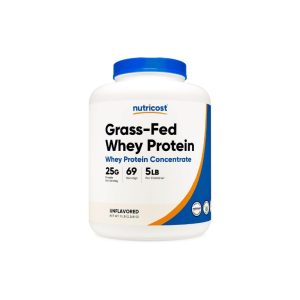

Key product features
What you should know
Nutricost Grass-Fed Whey Protein Concentrate is a more natural supplement featuring milk-sourced whey protein from cows not treated with recombinant bovine growth hormone (rBGH), a genetically engineered hormone given to cow’s to increase milk production. (6)
- Grass-Fed Whey Protein Concentrate from Nutricost provides 25 grams of high-quality protein in every serving.
- At $1.62 per serving, Grass-Fed Protein Concentrate costs slightly less than the average market price and offers good value given its list of simple and natural ingredients.
- This protein powder makes a good choice for environmentally conscious individuals looking for a quality whey protein powder made with natural ingredients.
- The flavored Grass-Fed Whey Protein Concentrate powders use natural flavors and nonnutritive natural sweeteners like stevia.
Our take on Nutricost Grass-Fed Whey Protein Concentrate
Nutricost Grass-Fed Whey Protein Concentrate is designed for folks looking for a more natural protein powder. The Grass-Fed Whey Protein Concentrate has a similar nutrition profile as their Whey Protein Concentrate, but is made with whey sourced from grass-fed cows not given recombinant bovine growth hormone (rBGH). (6)
One scoop (1/3 cup) of Nutricost Grass-Fed Whey Protein Concentrate has 120 to 150 calories, 1 to 5 grams of carbohydrates, 1.5 to 3 grams of fat, and 25 grams of protein. It also meets 10% of the daily value for calcium.
Grass-fed cows graze in pastures eating grass, while conventional cows are kept in feedlots and feed off grain. (7) Milk from grazing cows is higher in omega-3 fatty acids, anti-inflammatory properties, and antioxidants. (8) Grass-fed whey protein powder may provide more nutritional benefits than regular whey protein powder, but it doesn’t seem to have much of an effect on postworkout recovery. (9) A study comparing grass-fed to non grass-fed whey protein following resistance training found no differences in muscle repair or soreness. (9)
The whey protein powder is also free of recombinant bovine growth hormone (rBGH), a synthetic hormone that increases milk production and may increase risk of tumors in cows. (6) It’s not clear how rBGH may affect human health, but the hormone isn’t active in humans, and the FDA says milk and meat from cows treated with rBGH is safe to consume. (6) However, very few farmers in the United States use the synthetic hormone. (6)
Nutricost Grass-Fed Whey Protein Concentrate is made with more natural ingredients than the regular whey protein concentrate, using stevia and natural flavors instead of artificial sweeteners and flavors. And, buying the five-pound container lowers the price to $1.06 per serving. The flavored versions of Nutricost Grass-Fed Whey Protein Concentrate have fewer servings than unflavored and cost about $0.30 more for the two-pound container.
Nutricost Grass-Fed Whey Protein Concentrate is third-party tested and gluten-free. But, it’s only available in four flavors and isn’t a good choice for people with milk allergies or those who follow a vegan diet.
Who Grass-Fed Whey Protein Concentrate is recommended for:
- Health-conscious consumers looking for a more natural supplement
- Animal welfare advocates who need more protein in their diet
- People who want to avoid protein powder sourced from cows given rBGH
Who Grass-Fed Whey Protein Concentrate is not recommended for:
- People with allergies or sensitivities to dairy products
- People who follows a vegan diet
- Individuals with picky palates who prefer protein powders in different flavors
Expert opinion
“This blend offers a great amino acid profile like the non-grass fed, however stays away from the artificial sweeteners which makes it perfect for the consumer who is trying to go with whole foods and non-artificial ingredients. Due to the less artificial ingredients, there is less of a flavor option available,” Burgess notes.
What customers are saying
Amazon customers have left mostly positive reviews for Nutricost Grass-Fed Whey Protein Concentrate, rating it an average of 4.4 stars from 587 reviews. They like the low price and that it has few ingredients. While many people like that the protein powder is sweetened with stevia, some customers find the flavor overwhelming.
“This stuff is a life saver for me. Mixes well with milk in my shaker bottle. No clumps, no lumps, no chalky taste. It has minimal ingredients, and tastes really good (as far as protein powder goes). I highly recommend this.”
Username “Jack the Rabbit,” Amazon
Richard C. bought the unflavored Grass-Fed Whey Protein Concentrate because it has no sweeteners, though he doesn’t like the taste. “If you were to take the word “meh” and turn it into a food, this is exactly what it would taste like…The reason to buy this is to prevent the insulin spike that comes with drinking sweetened anything.”
Verified Amazon shopper Carlos dislikes the flavor of the grass-fed whey protein. “I mix the powder (vanilla) with a straight cold brew coffee and the stevia aftertaste is still overwhelming. Stevia should have been the proper flavor name.”
Specs
| Price per serving | $1.62 (two-pound container of unflavored) |
| Protein source | Grass-fed whey protein concentrate |
| Protein per serving | 25 g |
| Calories per serving | 120-150 |
| Carbs per serving | 1-5 g |
| Fat per serving | 1.5-3 g |
| Flavors | Unflavored, vanilla, chocolate, chocolate peanut butter |
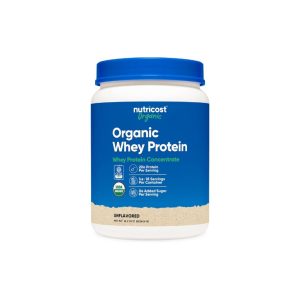

Key product features
What you should know
Nutricost Organic Whey Protein Concentrate is certified organic by the USDA and the California Certified Organic Farmers (CCOF). All four flavors of the protein powder provide 20 grams of protein and have no added sugar.
- Our testers said the unflavored protein powder mixed well, but the taste was “horrendous” and difficult to drink, even when mixed with milk.
- Nutricost Organic Whey Protein Concentrate is priced higher than the nonorganic versions at $1.47 per serving, but still costs a few cents less than the average market price.
- This is a good supplement for environmentally minded athletes looking for a budget-friendly organic protein powder.
- The flavored whey protein powders are sweetened with organic stevia.
Our take on Nutricost Organic Whey Protein Concentrate
Nutricost Organic Whey Protein Concentrate is a quality protein powder certified organic by the USDA and California Certified Organic Farmers (CCOF). The certifications indicate that the protein powder sources its whey from free-roaming, humanely treated cows not given synthetic hormones or antibiotics. (10)
Nutricost Organic Whey Protein Concentrate is available unflavored, as well as in double chocolate, chocolate peanut butter, and French vanilla flavors. The flavored protein powders have no added sugar, using organic stevia for sweetness. Nutricost also lists organic natural flavors as an ingredient for the flavored protein powders.
Even though the serving size is the same, the organic whey protein concentrate from Nutricost has less protein than the traditional and grass-fed versions, with 20 grams per scoop (between 1/4 and 1/3 cup).
“This is important to keep in mind if you are looking to reach a specific amount, especially post workout (0.2g/kg goal within an hour recommended).”
Victoria Burgess, PhD, CSCS, CISSN
There’s also a wide variation of calories and carbs between flavors. The unflavored protein powder has 100 calories and less than 1 gram of carbs, while the double chocolate has the highest calories and carbs with 150 calories and 10 grams of carbs per scoop.
We also noticed significant differences in vitamin and mineral content in the organic whey protein concentrate from Nutricost compared to the traditional and grass-fed versions. According to the Nutrition Facts label, all flavors except for unflavored have 10-20 mg of calcium per serving. Additionally, the double chocolate flavor is an excellent source of iron, meeting 20% of the daily value.
But the differences in macros may help meet different needs. For example, people looking for a lower calorie protein powder for weight loss may like the unflavored option, while endurance athletes may appreciate the extra carbs and calories in the double chocolate flavor. (2, 11)
Our testers weren’t impressed with the organic whey protein concentrate powder from Nutricost. They said it was relatively easy to mix and dissolved well, but they didn’t like the taste of the unflavored protein powder, rating it a one out of five. They said the taste of the protein shake was “horrendous” and difficult to keep down and would never use it again.
“I found this one hard to keep down. I would never use this protein powder again, it was that bad.”
Team Product Tester
At $1.47 per serving for the one-pound container of unflavored, Nutricost Organic Whey Protein Concentrate is priced within the average market. However, expect to pay more if you prefer flavored protein powders. A one-pound container of the double chocolate has only 11 servings, versus 18 for the unflavored, and costs $2.40 per serving. Two-pound containers are available for some flavors.
As our tester pointed out, it’s not a good value if you can’t drink it. Paying extra for a flavored version may make it a better value if you find it easier to consume.
Nutricost Organic Whey Protein Concentrate is third-party tested, made in a Good Manufacturing Practices (GMP) facility, and gluten-free. But it’s unsuitable for people following a dairy-free or vegan diet.
Who Organic Whey Protein Concentrate is recommended for:
- Bodybuilders looking for a more natural protein powder to support needs
- Breastfeeding individuals seeking a hormone-free protein supplement
- People wanting a lower calorie protein powder to support weight loss
Who Organic Whey Protein Concentrate is not recommended for:
- Individuals who avoid dairy for health or personal reasons
- People who use protein powder daily and need large containers
- Folks with picky palates who dislike the taste of stevia
Expert opinion
“This blend is certified organic so for the consumers who follow that, this is helpful,” Burgess notes. “It does have less protein per serving, and a bit more calories than the traditional and grass-fed, so keeping that in mind when making a decision if based off calories.”
Specs
| Price per serving | $1.47 (one-pound container of unflavored) |
| Protein source | Organic whey protein concentrate |
| Protein per serving | 20 g |
| Calories per serving | 100-150 |
| Carbs per serving | 1-10 g |
| Fat per serving | 1-2 g |
| Flavors | Unflavored, double chocolate, French vanilla, chocolate peanut butter |
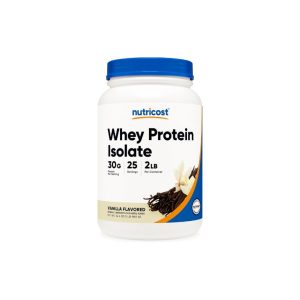

Key product features
What you should know
With 30 grams of protein per serving, Nutricost Whey Protein Isolate has a high protein content, packing in more of the muscle-building nutrient than many other protein powders on the market. It’s also low in carbs and fat as isolate is its most concentrated form of protein.
- Whey protein isolate is processed to remove nearly all fat and carbs, creating a highly concentrated source of protein. (1)
- Nutricost Whey Protein Isolate is one of the pricier proteins the brand offers, but at $2.15 per serving it’s only slightly higher than the average market price.
- This protein powder is best for bodybuilders who maximize protein intake to bulk up.
- The flavored whey protein isolate powders contain artificial sweeteners, including sucralose and acesulfame potassium (AceK).
Our take on Nutricost Whey Protein Isolate
Nutricost Whey Protein Isolate is an excellent source of high-quality protein, providing 30 grams of protein in every scoop (1/3 cup serving). The high protein content is due to the type of whey used in the Nutricost protein: whey protein isolate.
Whey protein isolate is processed to a greater extent than whey protein concentrate, creating a powder that’s 90% protein. (1) We do like that Nutricost Whey Protein Isolate has 10 flavors, but nutrition information varies from flavor to flavor. Each scoop has about 1 to 5 grams of carbs, less than 2 grams of fat, and 130 to 160 calories per serving.
The higher protein formula may make it easier for bodybuilders and athletes to get the extra protein necessary to maintain or build muscle. (2)
In addition to packing in protein, whey protein isolate is very low in lactose, the main carbohydrate in milk. People with lactose intolerance may tolerate whey protein isolate powders better than those made with whey protein concentrate. (12)
However, the flavored versions of the whey protein isolate contain artificial sweeteners, including sucralose and acesulfame potassium (AceK), which are generally safe but may cause other unwanted side effects. (6) Some of the flavored protein powders also contain a long list of ingredients, including artificial flavors and fillers.
If you have food allergies, carefully check the label of the flavored protein powders as they may contain common food allergens including wheat or peanuts, along with milk.
The servings per container also vary between the flavors of Nutricost Whey Protein Isolate, affecting price. A two-pound container of unflavored has 26 servings and costs $2.15 per serving, while a two-pound container of cookies and cream has 22 servings and costs $2.72 per serving. Nutricost Whey Protein Isolate is priced higher than the average market price. If you use protein powder frequently, you can save money by purchasing the five-pound containers, which range from $1.12 to $1.33 per serving.
Nutricost uses instantized whey protein isolate, combining the whey protein with sunflower lecithin, an emulsifier, so it mixes better in fluids. (13) Removing most of the fat and carbs from whey protein affects solubility, causing a clumpy protein shake if you don’t shake it enough or use a blender. Adding the emulsifier aims to reduce clumping.
Nutricost Whey Protein Isolate is third-party tested and made in a Good Manufacturing Practices (GMP) compliant facility.
Who Whey Protein Isolate is recommended for:
- Bodybuilders who need more protein to bulk up
- High-performance athletes during intense training
- People looking for a lower calorie protein powder to support weight management
Who Whey Protein Isolate is not recommended for:
- People with allergies to milk
- Individuals who prefer natural sweeteners
- People following a vegan diet
Expert opinion
“This blend offers at least 10 g more protein per serving than the other blends listed above,” Burgess notes. “That cuts down on needing to double scoop to reach a higher protein amount and then getting more out of the bucket.”
What customers are saying
Over 8,000 Amazon customers have reviewed Nutricost Whey Protein Isolate, rating it an average of 4.4 stars. Many like the price, protein content, taste, and solubility. However, some customers report inconsistencies in the supplement.
“It starts out overtly sweet, then mellows out to a pleasant artificial chocolate flavor, then it has a slight chemically aftertaste. I am unaware of any tested or untested whey isolate at this price point. This is a steal. This stuff is great.”
Alex N., Amazon
An Amazon customer who goes by the username “Treat” writes, “Mixes into water really well and has a decent taste. Price isn’t too bad either.”
“RTM” is an Amazon reviewer who regularly buys Nutricost protein, but finds it inconsistent: “I’ve bought the unflavored isolate many times. The taste is fine and it doesn’t cause me any gastric issues—two issues others have called out. But I find it is inconsistent in texture and solubility.”
Specs
| Price per serving | $2.15 (two-pound container of unflavored) |
| Protein source | Whey protein isolate |
| Protein per serving | 30 g |
| Calories per serving | 130-160 |
| Carbs per serving | 1-5 g |
| Fat per serving | 0.5-1.5 g |
| Flavors | Unflavored, cake batter, chocolate peanut butter, cookies & cream, milk chocolate, mocha, salted caramel, strawberry milkshake, strawberry acai, vanilla |
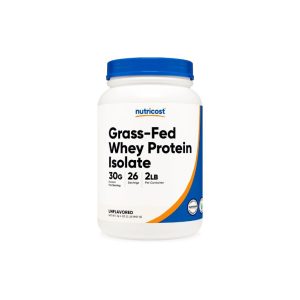

Key product features
What you should know
Nutricost Grass-Fed Whey Protein Isolate is a high-protein supplement sourced from grass-grazing cows that packs in 30 grams of protein per scoop.
- Our testers noted that the powder requires a little extra effort when mixing, but the flavor was good overall—though it may be too sweet for some.
- At $1.63 per serving, Nutricost Grass-Fed Whey Protein Isolate is priced slightly higher than the average market price, but is a good value for the amount of protein per serving.
- This is a good choice for elite athletes looking for a high-quality protein powder to maintain muscle and strength when training.
- Nutricost Grass-Fed Whey Protein Isolate is low in carbs and fat, with 130 to 150 calories per serving depending on flavor choice.
- The whey protein in the Nutricost supplement is sourced from cows not given recombinant bovine growth hormone (r-BGH), a synthetic hormone that increases milk production.
Our take on Nutricost Grass-Fed Whey Protein Isolate
Nutricost Grass-Fed Whey Protein Isolate is a high-protein supplement that uses more natural ingredients than the traditional Whey Protein Isolate formula.
Both whey protein isolate formulas from Nutricost provide 30 grams of protein, but the grass-fed protein supplement sources the whey from pasture-grazing cows. The grass-fed whey protein isolate formula also combines the protein with sunflower lecithin to improve solubility. (13)
One of the more significant differences between the two whey protein isolate formulas are the flavor choices. The grass-fed formulas come in only three flavors, including unflavored, vanilla, and chocolate, versus the 10 flavors for the traditional whey protein isolate from Nutricost. Limiting flavor choices makes it easier for Nutricost to minimize ingredients and use more natural ingredients like stevia and natural flavors.
Nutrition information is fairly consistent between flavors. One scoop (1/3 cup) provides 130 to 140 calories, 2-4 grams of carbohydrates, and less than 1 gram of fat. “Although it appears to be higher in calories, the higher protein content makes the majority of the total calories,” Burgess notes.
The Grass-Fed Whey Protein Isolate formulas also provide small amounts of essential nutrients, including calcium, iron, and magnesium. However, both the chocolate and vanilla flavors have added salt and are higher in sodium, meeting 13-14% of the daily value.
Our product testers tried the chocolate flavored Grass-Fed Whey Protein Isolate and rated it a four out of five for taste, and liked it better mixed with water than milk. They did find the protein powder difficult to mix, giving it a rating of two out of five for solubility, noting that their protein drink remained clumpy after 10 seconds of shaking. Despite low solubility, our tester thought the chocolate grass-fed whey protein isolate is a good product, especially for those with a sweet tooth.
“The shake was still a little chunky after shaking for 10 seconds. I found the shake too thick and frothy when I mixed it with milk and liked it better with water. Overall, I think it’s a good product, especially for those who like sweets. It does need extra effort for mixing, adding more water or milk helps.”
Team Product Tester
At $1.63 per serving, Nutricost Grass-Fed Whey Protein Isolate is priced a little higher than average, but is a good value given the quality of the supplement. Servings per container vary between flavors, and investing in a five-pound container may save you about $0.40 per serving ($1.26 per serving for five-pound unflavored).
The grass-fed whey protein isolate is third-party tested, made in a GMP compliant facility, rBGH-free, and gluten-free. But, as milk-based protein powder, it’s not suitable for people with milk allergies or people who follow a vegan diet.
Who Grass-Fed Whey Protein Isolate is recommended for:
- Environmentally conscious individuals who want a low-carb protein powder for weight management
- Lactose-intolerant bodybuilders looking for a whey protein powder that won’t upset their stomach
- Athletes in-training who need a protein powder that’s easy to consume after workouts
Who Grass-Fed Whey Protein Isolate is not recommended for:
- People allergic to milk
- Individuals who follow a vegan diet
- People who need to limit protein intake for health reasons
Expert opinion
“Similar to the non grass fed isolate, this blend offers a whooping 30g protein per serving. It’s perfect for users who are trying to intake extra protein throughout their day,” Burgess comments.
What customers are saying
Nutricost Grass-Fed Whey Protein Isolate has more than 1,005 reviews on Amazon, with an average rating of 4.4 stars. Customers like the taste and quality of the protein powder, but have mixed opinions about mixability.
“This protein powder is versatile. I’ve used it in a variety of recipes: protein breads, smoothies, sauces, and other dishes. There are no artificial sweeteners, so you can control the taste and use the sweetener of your choice.”
Elle, Amazon
“PW” is an Amazon customer who finds the protein powder easy to digest: “I have used it for pre & post workout as well as a substitute for a meal. I am so pleased that I am able to finally get more protein in my body without side effects.”
Amazon customer “lacy_s” remarked about the protein powder’s solubility. “This does not completely dissolve, leaves clumps even after blending.”
Specs
| Price per serving | $1.63 (two-pound container of unflavored) |
| Protein source | Grass-fed whey protein isolate |
| Protein per serving | 30 g |
| Calories per serving | 130-150 |
| Carbs per serving | 2-4 g |
| Fat per serving | 0.5-1 g |
| Flavors | Unflavored, chocolate, vanilla |
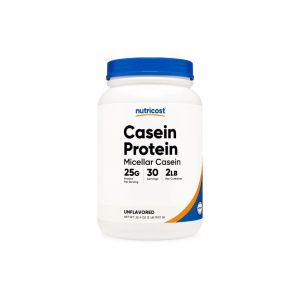

Key product features
What you should know
Nutricost Casein Protein is an affordable protein powder that packs in 25 grams of high-quality micellar casein for post-workout muscle recovery. It’s also a slow-digesting protein that keeps you full longer. (14)
- Supplementing with casein protein before bed may support muscle protein synthesis while sleeping. (2)
- At $1.60 per serving, Nutricost Casein Protein costs less than the average market price for protein powders, making it an affordable supplement.
- This is a good choice for individuals looking for a protein powder that satisfies their appetite to support weight loss goals.
Our take on Nutricost Casein Protein
Nutricost Casein Protein is another affordable, high-quality protein powder. One scoop (1/3 cup) provides 25 grams of protein, less than 1 gram of fat, 3 grams of carbs or less, and 110 to 120 calories.
Casein is a milk protein like whey and rich in all of the essential amino acids necessary for building muscle. (2) Casein also has high amounts of leucine, the amino acid that initiates muscle building. (2). But as a slow-digesting protein, casein is less effective at building muscle than whey protein due to its slow release not being readily available for MPS, which is quicker absorbed. (2)
Consuming a casein protein powder before bed may support workout recovery. Research shows that consuming 40 to 48 grams of casein 30 minutes before bed following resistance training benefits muscle recovery. (15) Pre-sleep casein may also support muscle maintenance in older adults at risk of sarcopenia, age related muscle loss. (16) You may need to increase your serving of Nutricost Casein to get the effective dose.
Casein supplements also help with appetite control, keeping you full longer, and may benefit people looking for a protein powder to support weight loss goals. (14)
We also like Nutricost Casein Protein because it’s an excellent source of calcium, meeting 45% of the daily value.
Though the ingredients list for the Nutricost protein is short, the flavored formulas contain artificial flavors and sweeteners. It’s also a milk-based protein powder and not suitable for people allergic to milk or those who follow a vegan diet.
Nutricost Casein Protein is third-party tested, gluten-free, and made in a GMP-compliant facility.
Price for the protein powder varies by flavor, ranging from $1.60 for unflavored to $1.84 for the chocolate flavor for a two-pound container. Even with the price variations, the Nutricost supplement costs less than the average. The price per serving for a five-pound container is even better, ranging from $1.32 to $1.56 per serving.
Who Casein Protein is recommended for:
- Bodybuilders looking for a pre-sleep protein powder to support workout recovery
- Individuals seeking a protein powder for weight management
- Older adults struggling to meet protein and calcium needs from food
Who Casein Protein is not recommended for:
- People who must avoid milk due to allergies
- People following a vegan diet
- Active-individuals seeking fast-absorbing protein to build muscle
Expert opinion
“Casein protein is a great source of slow release protein that is most often used for night time, pre-bed protein,” Burgess explains. “Its slow absorption allows the user to benefit in MPS the entire night. One thing to keep in mind is sometimes pre-bed protein intake can increase body temperature as it has a higher thermogenic effect, and might disrupt sleep quality. This can vary with users.”
What customers are saying
Over 1,900 Amazon customers have reviewed and rated Nutricost Casein Protein Powder, giving it an average of 4.4 stars. They like the value, versatility, and effectiveness of the protein powder. However, some customers dislike the texture, saying it’s too gritty and chalky.
“I am a bodybuilder so I use it at night before sleep. It’s great for muscle recovery while you’re sleeping since that’s when your body is rejuvenating.”
Username “HEARTHA,” Amazon
“Rbgiantfan” is an Amazon customer who likes the quality and price of the supplement, but doesn’t like the texture. “I bought this casein protein for my off day recovery supplement. It is made from quality ingredients and the nutritional values are very good. The chocolate flavor is good and not overpoweringly sweet. My one criticism is that the consistency is a little gritty.”
Specs
| Price per serving | $1.60 (two-pound container of unflavored) |
| Protein source | Micellar casein |
| Protein per serving | 25 g |
| Calories per serving | 110-120 |
| Carbs per serving | 0-3 g |
| Fat per serving | 0-0.5 g |
| Flavors | Unflavored, vanilla, chocolate |
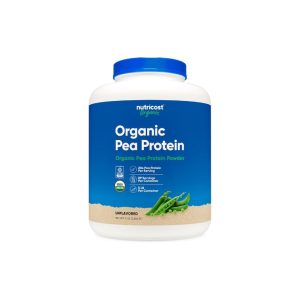

Key product features
What you should know
Nutricost Organic Pea Protein is an effective protein powder perfect for vegans and individuals who want to add more plant protein to their diet. Each serving has 20 grams of protein, 1.5 grams of fat, 1 gram of carbs, and 100 calories.
- Nutricost Organic Pea Protein Isolate Powder provides all of the essential amino acids necessary for repairing and building muscle. (17)
- The organic pea protein is priced well-below the market average at $0.67 a serving, suitable for even limited budgets.
- This is a good choice for vegan bodybuilders struggling to meet protein needs for muscle gains.
- The organic plant-based protein powder is certified organic by the USDA and California Certified Organic Farmers (CCOF).
Our take on Nutricost Organic Pea Protein
At $0.69 per scoop (24-26 grams), Nutricost Organic Pea Protein is priced well-below the average market price and is an affordable plant-based protein powder. The single-ingredient plant protein powder contains only organic pea protein isolate.
Pea protein isolate has all of the essential amino acids like whey and casein, but is less allergenic and more sustainable. (18) It also works as well at promoting muscle growth as whey protein when combined with resistance training, making it a good substitute for people searching for a plant-based protein to supplement their diet and meet fitness goals. (19)
Nutricost Organic Pea Protein isn’t as high in protein per serving as some of whey protein supplements, but it meets the ISSN protein recommendations to support muscle maintenance and growth. (2) The pea protein is also low in calories, fat, and carbs.
Additionally, pea protein is an excellent source of iron, meeting 30% of the daily value. People who follow a vegetarian or vegan diet and struggle to meet iron needs may find pea protein powder an easy way to boost protein and iron intake. (20)
Unlike many of the other protein powders on our list, the organic pea protein is suitable for dairy-free and vegan diets. It’s also gluten-free, certified organic by the USDA and CCOF, third-party tested, and made at a GMP-compliant facility.
We also like the unflavored Nutricost Organic Pea Protein for its simplicity and versatility. You can add the single-ingredient protein powder to smoothies, muffin batter, or soup. However, it’s not as convenient as flavored protein powders that only need milk or water and a shaker cup. The organic pea protein powder from Nutricost also mixes better in a blender.
The price for the two-pound container of Nutricost Organic Pea Protein is very low compared to other protein powders, but you can save even more with the five-pound container at $1.48 per serving.
Who Organic Pea Protein is recommended for:
- Vegans with high protein needs
- Bakers who want to add protein to baked goods
- Athletes seeking a milk-free protein powder to support nutrition needs
Who Organic Pea Protein is not recommended for:
- Individuals who prefer flavored protein powders
- People who need a high-calorie protein supplement for weight gain
- Gym-goers who prefer the creaminess of whey protein powder
Expert opinion
“This blend, with its full amino acid profile, makes it a great substitute for those who are looking to stay away from whey or casein,” says Burgess. “Often times, it is easier on the stomach than whey protein, so for those who complain of GI distress with whey, would be good to try pea protein.”
What customers are saying
Almost 700 customers have reviewed Nutricost Organic Pea Protein on Amazon, giving it an average rating of 4.1 stars. Customers say they like the ingredients and value, but not all agree on taste.
“5lbs container looks huge and certainly great value for the money! … You wanna be healthy then you need to focus on the benefits of the food you consume and not solely the taste. Of course it’s pretty much organic pea based and one of the best clean plant based protein products…no sugar or carb!” Username “
Lz,” Amazon
Amazon customer Mark is a regular pea protein user and says the taste of the Nutricost supplement is mild. “I am happy to say that the taste is much better than all the other pea proteins I have used in the past. It is easy to dissolve and works great in smoothies.”
Specs
| Price per serving | $0.83 (two-pound container) |
| Protein source | Organic pea protein isolate |
| Protein per serving | 20 g |
| Calories per serving | 100 |
| Carbs per serving | 1 g |
| Fat per serving | 1.5 g |
| Flavors | Unflavored |
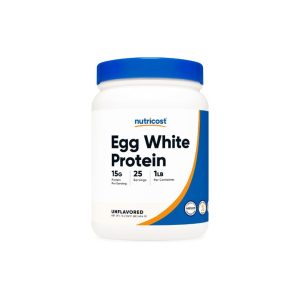

Key product features
What you should know
Each serving of Nutricost Egg White Protein powder provides 15 grams of high-quality protein with only 70 calories.
- Egg white protein provides the same amount of branched-chain amino acids as milk protein. (21)
- Nutricost Egg White Protein powder costs less than most protein powders at $1.20 per serving.
- We think Nutricost Egg White Protein powder is a good choice for fitness-focused individuals who want a versatile protein powder for making protein shakes and high-protein baked goods.
Our take on Nutricost Egg White Protein
Nutricost Egg White Protein is a high-quality protein powder that’s low in carbs and calories and fat-free. One scoop (three tablespoons) provides 15 grams of protein, less than 1 gram of carbohydrates, and 70 calories.
Eggs are an ideal protein with a balanced amino acid profile, providing all of the essential amino acids in the amounts needed by the body. (21) Many people have concerns about eggs because of cholesterol content and heart health. However, eggs are a nutritious and affordable source of protein, and you may only need to limit egg intake if you have high cholesterol. (22) “Further, the cholesterol is found in the yolk, therefore this being egg whites won’t be an issue,” adds Burgess.
Since egg whites are pure protein and have no fat or cholesterol, no one needs to limit intake. They’re also rich in branched-chain amino acids (BCAAs) like leucine to support muscle protein synthesis. (2, 21) However, they’re not a popular protein powder choice for muscle building because of limited research evaluating their potential benefits. (2) But research shows that supplementing with any high-quality protein powder may help older adults meet their protein needs and support muscle strength. (23)
We like Nutricost Egg White Protein because it’s a single-ingredient, unflavored supplement you can use in baked goods or shakes. At $1.20 per serving for a one-pound container, the egg white protein powder is priced below the average market price. But, the protein content per serving is lower than many of the other Nutricost protein powders.
The egg white protein powder from Nutricost is third-party tested and manufactured in a GMP-compliant facility, ensuring quality and safety. Nutricost Egg White Protein is a good alternative for people allergic to cow’s milk, but not for people with egg allergies or those who follow a vegan diet.
We may not have as much research supporting the muscle-building benefits of egg protein, but its amino acid profile closely resembles whey protein. If you’re looking for a versatile protein supplement that’s low in calories, carbs, and fat, then you may consider Nutricost Egg White Protein.
Who Egg White Protein is recommended for:
- Individuals who want to use unflavored protein powder for baking
- Fitness enthusiasts looking for a smoothie protein-booster
- Older adults struggling to meet daily protein needs
Who Egg White Protein is not recommended for:
- Anyone allergic to eggs
- People who follow a vegan diet
- Folks who prefer flavored protein powders
Expert opinion
“This blend is a great lower calorie option that is high in BCAAs, and contains L-leucine which is important for muscle recovery,” says Burgess.
What customers are saying
Nutricost Egg White Protein powder has an average rating of 4.5 stars on Amazon from over 200 reviews. Consumers like its versatility, protein content, and simplicity. However, some consumers report it doesn’t mix well.
“Great for making bread. Good value. Great protein.”
Username “Florida,” Amazon
Branko B. highly recommends the protein supplement, even though it’s hard to mix. “While it doesn’t mix well at all, simply use a little water and chew on it. It will foam up when using a mixer like a normal egg. The flavor is very mild. Highly recommended.”
Specs
| Price per serving | $1.20 (one-pound container) |
| Protein source | Egg white protein |
| Protein per serving | 15 g |
| Calories per serving | 70 |
| Carbs per serving | Less than 1 g |
| Fat per serving | 0 g |
| Flavors | Unflavored |
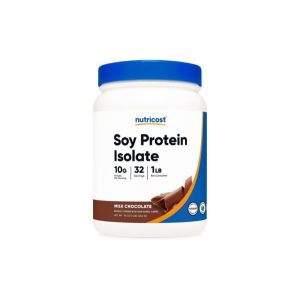

Key product features
What you should know
A chocolate-flavored plant protein powder, Nutricost Soy Protein Powder provides 10 grams of protein, 2 grams of carbs, zero fat, and 50 calories per serving.
- Soy protein is a high-quality protein that provides all of the essential amino acids necessary for building and maintaining muscle. (24)
- Like many of the other Nutricost protein powders, the soy protein is priced less than the average market price at $0.67-$0.84 per serving.
- This is a good choice for vegan athletes on a tight budget looking for a high-quality chocolate flavored protein powder.
Our take on Nutricost Soy Protein Powder
Nutricost Soy Protein Powder is a high-quality plant protein featuring soy as the main ingredient. Before pea protein became popular, soy protein was the go-to plant-based protein supplement. (24)
Soy is a complete protein and fast-absorbing like whey, but it may not carry the same muscle-building benefits due to lower amounts of BCAAs, poor absorbability, and phytoestrogens (plant hormone naturally found in soy) that may inhibit muscle protein synthesis. (2)
But, soy protein may support muscle recovery following resistance training better than casein. (25) Beyond muscle-building, soy protein has anti-obesity and anti-diabetes properties and may help improve cholesterol levels. (26, 27)
“Soy protein is easier to absorb than casein, making it more available for MPS.”
Victoria Burgess, PhD, CSCS, CISSN
Adding soy protein to your diet may support weight management by decreasing appetite and improving body composition, according to a 2021 randomized clinical trial published in Nutrients. (28) Though more research is needed to better understand the potential health benefits of soy for weight and wellness.
At $0.67-$0.84 per serving, Nutricost Soy Protein Powder is a budget-friendly protein powder, priced about $0.80 less than the average market price. As an affordable supplement that comes in a one-pound container, Nutricost Soy Protein Powder is a good choice for individuals who want to try a protein powder to support health without making a huge investment.
However, the soy protein powder only comes in chocolate flavor and may not suit everyone’s tastes. It’s also sweetened with sucralose and provides less protein—10 grams per scoop (11-14 grams)—than other protein powders, including pea protein. But the protein powder is also lower in calories, and you can double to dose to get the same amount of protein as whey protein powder supplements.
Nutricost Soy Protein Powder is third-party tested, made in a GMP-compliant and FDA-registered facility, and a non-genetically modified organism (GMO) product. Non-GMO foods don’t have any genetically modified ingredients. (29)
All of the Nutricost protein powders in our review are non-GMO products, but we want to point it out with the soy supplement since most of the soy in the United States is genetically modified to resist weed killer glyphosate. It’s not the GMO part of soy that’s most concerning, but potential overexposure to glyphosate and the unknown long-term health effects, which is why medical experts recommend limiting intake. (30)
Who Soy Protein Powder is recommended for:
- People who follow a vegan diet or people who are allergic to dairy looking for a chocolate protein supplement
- Lactose intolerant bodybuilders who want a protein boost
- People looking for a budget-friendly plant-based protein powder
Who Soy Protein Powder is not recommended for:
- Bodybuilders who need a high-protein supplement to bulk up
- Anyone allergic to soy
- Individuals who prefer natural sweeteners
Expert opinion
“This soy blend is perfect for those trying to stay away from dairy products,” notes Burgess. “Its more absorbable faster than casein, making it similar to whey by being available for that after workout MPS.”
What customers are saying
Almost 90 customers have reviewed Nutricost Soy Protein on Amazon, giving it an average rating of 3.9 stars. Reviews are mixed. Some like the value, but not everyone agrees on taste.
“I needed to add soy protein to my diet to help lower my cholesterol and I came upon this brand. I’ve been adding it into my steel cut oats in the morning and the vanilla adds to the flavor and a hint of sweetness to the oats. I will be buying this brand again as needed!”
Username “Honda dad,” Amazon
Phillip L. is a verified Amazon shopper who likes the taste and nutrition of the soy protein powder, saying, “has amazing macros – tastes good: not too sweet and not too artificial – good for drinks, yoghurt, porridge etc.”
Amazon customer R. Lilley likes the price, but not the taste of Nutricost Soy Protein. “We liked the price. Unfortunately the taste when only mixed with water is terrible.”
Specs
| Price per serving | $0.67-$0.84 (one-pound container) |
| Protein source | Soy protein isolate |
| Protein per serving | 10 g |
| Calories per serving | 50 |
| Carbs per serving | 2 g |
| Fat per serving | 0 g |
| Flavors | Chocolate |
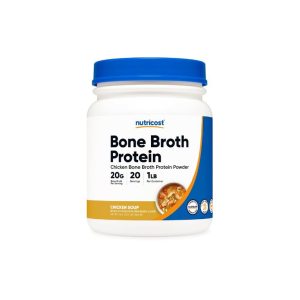

Key product features
What you should know
Nutricost Bone Broth Protein is a savory supplement you mix with hot or cold water, providing 20 grams of protein, zero fat, 0-3 grams of carbs, and 80-90 calories.
- Bone Broth Protein isn’t a complete protein, so you need to include it as part of a balanced diet to get all of the essential amino acids. (31)
- At $1.30 per serving. Nutricost Bone Broth Protein costs less than the average market price for protein powders.
- This protein powder makes a good choice for people who want to boost their protein intake, but prefer savory flavors.
- Nutricost Bone Broth Protein is available in chicken and beef flavors.
- The beef bone broth protein is high in sodium with 220 milligrams per serving, meeting 24% of the daily value.
Our take on Nutricost Bone Broth Protein
Nutricost Bone Broth Protein follows the bone broth trend, aiming to provide a nutrient-rich supplement packed with protein. One scoop (20-27 grams per scoop) has 20 grams of protein, 0 grams of fat, 0-3 grams of carbohydrates, and 80-90 calories.
The bone broth protein is a concentrated source of protein, but it doesn’t supply all of the essential amino acids like whey, pea, or soy protein. (31) Nutricost Bone Broth Protein may support nutrition needs, but it should be part of a balanced diet to ensure you get all the amino acids your body needs. “Although not a complete protein, it can still count towards your daily protein intake,” comments Burgess.
Bone broth is touted as a nutrient-packed broth rich in collagen, calcium, and anti-inflammatory agents. (31, 32) However, Nutricost Bone Broth Protein provides very little calcium (0-7 milligrams per serving), and meets only 2% of the daily value for iron and 10% of the daily value for potassium in the beef option.
Though the broth may contain collagen precursors, it may not supply enough to provide the health benefits associated with collagen supplements like improvements in skin health. (33, 34) Early research shows that bone broth protein may contain anti-inflammatory properties, but it’s not known how it may benefit human health. (31) Despite the claims, bone broth and bone broth proteins like the one from Nutricost may not deliver the nutrition you expect.
Nutricost Bone Broth Protein is a lower cost protein powder, priced at $1.30 per serving, about $0.20 less than the market average. The protein supplement is third-party tested and made in a GMP-compliant facility. It’s also gluten-free, but not a good choice for people who follow a vegan or vegetarian diet.
Nutricost Bone Broth Protein is available in chicken or beef flavor and makes a savory alternative protein source for those looking for an alternative to the mostly sweet protein powder options. You can mix the powder with cold or hot water and drink after a workout or use it as a broth-base for soup. It also works well with savory foods like mashed potatoes, rice, and casseroles, boosting protein in everyday foods to help keep you from falling short on meeting needs.
Who Bone Broth Protein is recommended for:
- Older adults who struggle to meet protein needs
- People who want more protein and prefer savory flavors
- Individuals looking for a low-cal, high-protein powder for weight management
Who Bone Broth Protein is not recommended for:
- Vegans and vegetarians
- Bodybuilders who need a complete protein for muscle growth
Expert opinion
“Although this blend is not a complete source of protein, it’s a great addition for its collagen boosting properties,” Burgess says.
What customers are saying
Nutricost Bone Broth Protein has an average rating of 4.6 on Amazon. Customer reviews are mostly positive. They like the taste and nutrition and find it easy to mix.
An Amazon reviewer who goes by “Scooby Doo” is a Vine reviewer who received the Bone Broth Protein for free from Amazon to provide a thoughtful review of the product. They wrote that they liked the broth, but disliked aftertaste and the effort required to mix.
“The powder dissolved with a bit of serving. The broth tasted like regular broth but had a slightly bitter taste also, that I sometimes notice in bone broth. Once I sipped all of it, there was a little bit of deposits left in the cup, but not bad. The taste was not overly salty, which I appreciate.”
Username “Scooby Doo,” Amazon
Nat P. is another Amazon Vine reviewer who liked the taste and nutrition of the bone broth protein. “Unlike many chicken bone broth powders that I have tried, this one is very flavorful. I basically use this as a soup base for ramen, but mostly shirataki noodles. A serving of this amounts to 20 grams of protein, and so this comes in very handy when it comes to stacking protein to reach target daily protein goals, and without piling on carbs and fat.”
Specs
| Price per serving | $1.30 (one-pound container) |
| Protein source | Chicken or beef bone broth protein powder |
| Protein per serving | 20 g |
| Calories per serving | 80-90 |
| Carbs per serving | 0-3 g |
| Fat per serving | 0 g |
| Flavors | Chicken, beef |
We’ve featured Nutricost protein powder in:
- Best protein powders
- Best clean protein powders
- Best low-carb protein powders
- Best protein powders for muscle gain
- Best pea protein powders
- Best casein protein powders
- Best protein powders for weight loss
- Best mass gainers
- Best protein shakes
- Best meal replacement shakes
How we test protein powders
We’re committed to providing protein powder reviews you can trust. That means testing each product we recommend, providing you with genuine and impartial feedback. Learn more about our supplements testing methodology for more information on each factor. From ingredient purity to efficacy to taste and more, here’s how we evaluated the protein powders in this review.
Efficacy—40%
Consumers turn to dietary supplements to achieve specific health benefits and reach their performance goals, which is why we examine whether a supplement delivers on its promised benefits. Efficacy doesn’t just mean the effectiveness of the product in achieving its claims, but also the evidence that supports those claims.
Here’s what we look for:
- Clinical evidence
- Calories per serving
- Dose efficacy
- Synergistic effects
- Proprietary blends
Safety and side effects—35%
Health risks, adverse effects, and safety profiles are all factors to consider in a supplement. We ensure the safety of these products through testing, so you can trust the safety of the products you purchase.
We evaluate:
- Reported side effects
- Third-party testing
- Manufacturer accreditation
- Artificial sweeteners
Value—20%
Value isn’t just price—it’s also quality and efficacy for the price. We factor in a cost analysis to determine the true worth of a supplement in relation to its price and identify products that offer a solid return on investment.
Our factors in this rating include:
- Price per serving
Customer experience—5%
A customer’s experience with a company directly impacts satisfaction, loyalty, and the likelihood of repeat purchases. We include it in our testing process because the consumer experience guides purchasing decisions.
Our factors in this rating include:
- Ease of purchase
- Shipping and returns
- Customer support
Is nutricost a good brand?
Nutricost is a popular supplement brand based in Utah and has many factors that make it a good choice. Many Nutricost products, including their protein powders, are made with a short list of simple ingredients.
While many of the Nutricost’s supplements feature natural ingredients, some contain artificial flavors and sweeteners. The added ingredients are safe to consume, but it’s always better to have a limited intake of artificial ingredients to limit any unwanted side effects.
Consumer safety is important to Nutricost. The FDA leaves it up to the maker of the supplement to ensure their product is safe and effective and made using Good Manufacturing Practice (GMP) guidelines. (4) All of the Nutricost protein powders in the review were made in (GMP) compliant facilities.
All of the protein powders are also third-party tested for safety and quality.
Why is nutricost so cheap?
According to Nutricost’s Mission statement, the brand keeps supplements affordable by using exact ingredients and simple formulations. While they manufacture the supplements in the United States, the label states that ingredients are sourced globally. This approach may allow Nutricost to find suppliers that help them keep their prices low.
Though Nutricost is known for providing affordable supplements, pay attention to servings per container. Flavored versions of protein powders have fewer servings per container than the unflavored, increasing the price per serving. The retail price is the same, but you get less for your money.
Nutricost supplements quality
Nutricost supplements are quality products made with simple ingredients. Many Nutricost protein powders are made with sustainable ingredients like grass-fed whey protein and organic pea protein. They also minimize the use of artificial ingredients and fillers. The quality across the board in all the blends allows the consumer to know they will receive quality regardless of personal choice.
Nutricost third-party testing
All of the protein powders in our Nutricost protein review are third-party tested for quality and safety. Third-party testing is one of the factors our team uses to assess supplement safety. It’s an independent lab study of the supplement, making sure it contains the ingredients listed on the label in the correct amounts.
Third-party testing reduces risk of side effects and adverse reactions to unlisted ingredients. The testing is voluntary and not offered by all supplement brands.
FAQs
Are nutricost supplements good?
Nutricost is a good and trusted brand. Their supplements are third-party tested, made in Good Manufacturing Practice (GMP) facilities, and contain simple ingredients. However, opinions differ on taste and quality of some of the products like protein powders.
Where is nutricost made?
Nutricost is located in Vineyard, Utah. The supplements are manufactured by Nutricost Manufacturing, LLC, also located in Utah. However, the ingredients are globally sourced, according to the package information, and may come from anywhere in the world.
Is nutricost protein good?
Nutricost protein is good. The supplements use quality proteins to support a range of needs, goals, and dietary preferences. They’re also third-party tested and made in GMP facilities. Individual opinions differ on taste, quality, and effectiveness.
These statements have not been evaluated by the Food and Drug Administration. These products are not intended to diagnose, treat, cure, or prevent any diseases.
Our experts
Victoria Burgess, Ph.D., CSCS, CISSN
Victoria Burgess earned her Ph.D. in Health and Human Performance from Concordia University Chicago and holds her NSCA CSCS and Certified Sports Nutritionist (CISSN). She is an adjunct professor in the Human Performance and Nutrition department at Concordia University Chicago & Parker University, where she teaches undergraduate, graduate, and doctoral-level courses.
Lauren Panoff, MPH, RD
Lauren Panoff, MPH, RD, is a plant-based registered dietitian, freelance writer, and content strategist for health and nutrition brands. She completed her nutrition education at Colorado State University, her dietetic internship through Michigan Medicine, and holds a Master of Public Health degree from Michigan State University. Lauren has been working in the wellness industry for over 15 years, including time spent in project management, public health standards, dietary supplement testing, inpatient and outpatient nutrition therapy, and child education. She has followed a plant-based lifestyle for over a decade and is passionate about helping others enjoy a healthier and more meaningful life.
Jessica Coulon
Jessica is a contributing editor and writer who specializes in fitness, health, nutrition, and science content. Previously, she was an editor for Popular Mechanics and Bicycling, where she covered pro cycling news, wrote how-to guides, and tested all the latest and greatest bike gear. She was also a regular shoe tester and contributor for Runner’s World. You can often find her skiing or riding her mountain bike, and racing with the F1RE female enduro team.
Lily Moe
Lily is a Brooklyn-based writer and editor with over seven years of experience in health media. As a former Fitness Coach, Lily’s editorial prowess has largely focused on fitness, nutrition, and weight management. She has also spent a fair share of time in testing labs, analyzing everything from protein powders to yoga mats. Her work has appeared in Verywell Fit, Verywell Mind, Health, and more.
Kelly Uhler
Kelly has a multifaceted background in elder care, health care, and copywriting. She has worked for organizations such as A Place For Mom and Homecare.com, which gave her the opportunity to work closely with families, providing reliable information to help them make informed decisions about their loved one’s health, safety, and quality of life.

Jill Corleone, RD
Fortune Recommends Nutrition Writer
About Author
Jill’s life has centered around nutrition and fitness for more than two decades. After earning her bachelor of science in nutrition at New York University in Manhattan, Jill went on to complete her internship at the University of Medicine and Dentistry of New Jersey in Newark.
She spent the early part of her career working as a clinical dietitian with a focus on pediatric nutrition. She then transitioned into management. Jill began her career as a freelance writer in 2007 while working as a clinical nutrition manager in Florida. She became a full-time writer in 2010 after the birth of her first child.
Jill has written for numerous publications, including Verywellfit, Diabetes Self-Management, Huffington Post, Livestrong.com, and SFGate.
